Three-year-old Jana from Gaza gets permit to travel for cancer treatment, after five months delay.
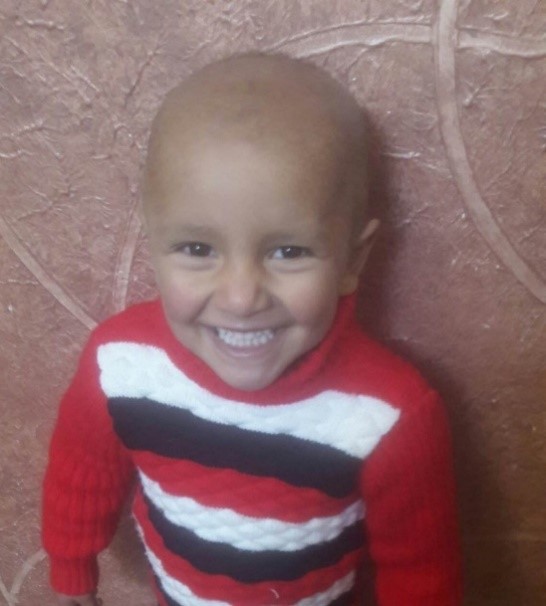 “Jana is one of hundreds of children who depend on Israeli-issued permits to travel to health facilities outside the Gaza Strip and for accompaniment of their parents.“
“Jana is one of hundreds of children who depend on Israeli-issued permits to travel to health facilities outside the Gaza Strip and for accompaniment of their parents.“
Three-year-old Jana from Jabalia in the north of the Gaza Strip has cancer, but she hasn’t been able to access the treatment she needs since October last year. Jana and her mother’s applications for Israeli-issued permits, required for her to access health facilities outside the Gaza Strip, have been repeatedly delayed or denied. Jana’s mother, Maysa, was increasingly concerned, “Jana was in a very critical condition. Doctors in Gaza told us that if she didn’t get treatment in time, she would need to undergo kidney dialysis.”
On the evening of Saturday 15 February, the day before Jana’s appointment, Jana and Maysa received a text message informing them they had been approved permits to travel to Augusta Victoria Hospital in East Jerusalem. Maysa talked about her relief, “I jumped up from the bed to the floor and started shouting, I was so happy as if I’d won a 1000-dinar prize!”. At 6am on Sunday 16 February, Jana and Maysa began the journey from their home to Erez checkpoint. Up to the last minute, Maysa was anxious and afraid they might be turned back.
Jana’s family discovered she had a tumour in 2018 when she was unable to pass urine and her family took her to Al-Shifa Hospital in Gaza City. A CT scan showed a tumour in her bladder and she underwent surgery to have it removed in January 2019. Initially the doctors at Al-Shifa had thought the tumour was benign. However, a biopsy in May 2019 confirmed that Jana had a cancer called a rhabdomyosarcoma.
From July 2019, Jana underwent a course of chemotherapy. Due to the size of her tumour, Jana then needed radiotherapy treatment that is not available in the Gaza Strip. She was referred to Augusta Victoria Hospital in East Jerusalem in October 2019, which required travel out of Gaza and an Israeli-issued permit. However, her permit application to Israeli authorities was delayed, remaining ‘under study’ by the time of her hospital appointment, and her mother’s application was denied.
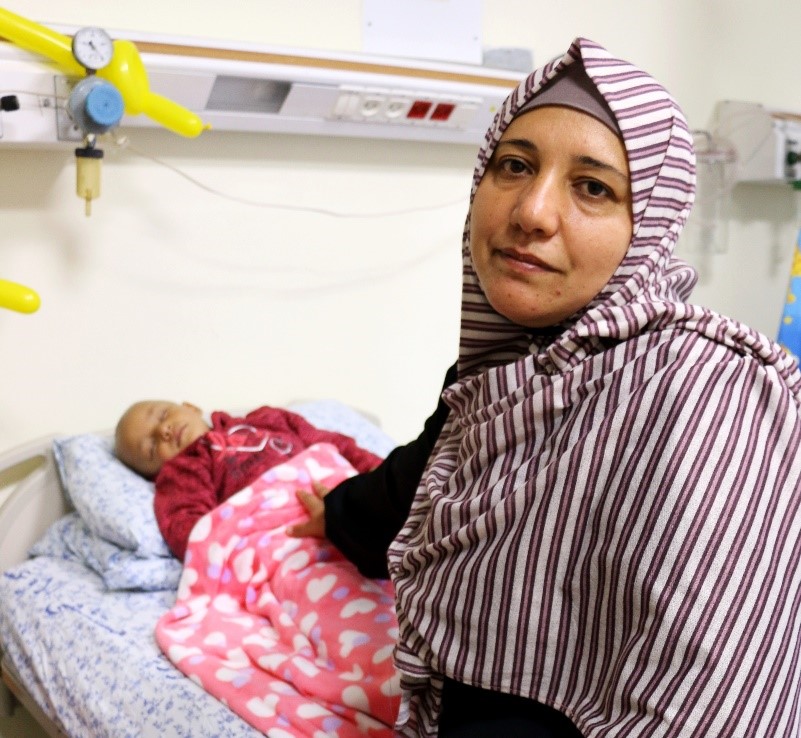 “I jumped up from the bed to the floor and started shouting, I was so happy as if I’d won a 1000-dinar prize!“Jana’s family discovered she had a tumour in 2018 when she was unable to pass urine and her family took her to Al-Shifa Hospital in Gaza City. A CT scan showed a tumour in her bladder and she underwent surgery to have it removed in January 2019. Initially the doctors at Al-Shifa had thought the tumour was benign. However, a biopsy in May 2019 confirmed that Jana had a cancer called a rhabdomyosarcoma.
“I jumped up from the bed to the floor and started shouting, I was so happy as if I’d won a 1000-dinar prize!“Jana’s family discovered she had a tumour in 2018 when she was unable to pass urine and her family took her to Al-Shifa Hospital in Gaza City. A CT scan showed a tumour in her bladder and she underwent surgery to have it removed in January 2019. Initially the doctors at Al-Shifa had thought the tumour was benign. However, a biopsy in May 2019 confirmed that Jana had a cancer called a rhabdomyosarcoma.
From July 2019, Jana underwent a course of chemotherapy. Due to the size of her tumour, Jana then needed radiotherapy treatment that is not available in the Gaza Strip. She was referred to Augusta Victoria Hospital in East Jerusalem in October 2019, which required travel out of Gaza and an Israeli-issued permit. However, her permit application to Israeli authorities was delayed, remaining ‘under study’ by the time of her hospital appointment, and her mother’s application was denied.
Since October 2019, Jana and Maysa applied three times for permits to exit Gaza so Jana could access the radiotherapy treatment she needs to have the best chance of recovery. Jana’s applications were delayed, remaining ‘under study’ by the time of her hospital respective appointments. Maysa’s applications to accompany Jana were once denied and twice delayed. The process has been a difficult and stressful one for Jana’s family, especially for Maysa: “I am Jana’s mother. I should have priority to accompany my daughter for such significant treatment. In any case, my daughter is a small child and she would have been distressed to be away from me for this amount of time.” Jana has four other siblings at home, two sisters and two brothers. Her oldest sister is a first-year student at university and youngest sister is in fourth grade.
Jana’s mother is waiting to find out the full treatment plan for her daughter at Augusta Victoria Hospital, which will depend on the test results. She is waiting to hear how long they will need to stay in Jerusalem and whether they will be able to go back to Gaza between treatments. The Palestinian Ministry of Health covers treatment costs, but the family has to pay for the transportation and other needs. The process can become a costly one, placing strain on the families of patients from the Gaza Strip, which has some of the highest rates of unemployment in the world, with nearly half (46%) of people living below the poverty line.
Hundreds of children like Jana in the Gaza Strip continue to face barriers and delays to health access, as well as potential separation from their parents. In 2019, more than a quarter (28%) of the 7,566 permit applications for children to exit the Gaza Strip for healthcare were unsuccessful – either denied (5%) or delayed (23%), with families receiving no definitive response to their permit applications by the time of their hospital appointments. In the vast majority of cases, Israeli authorities provide no explanation for why permit applications are not successful.
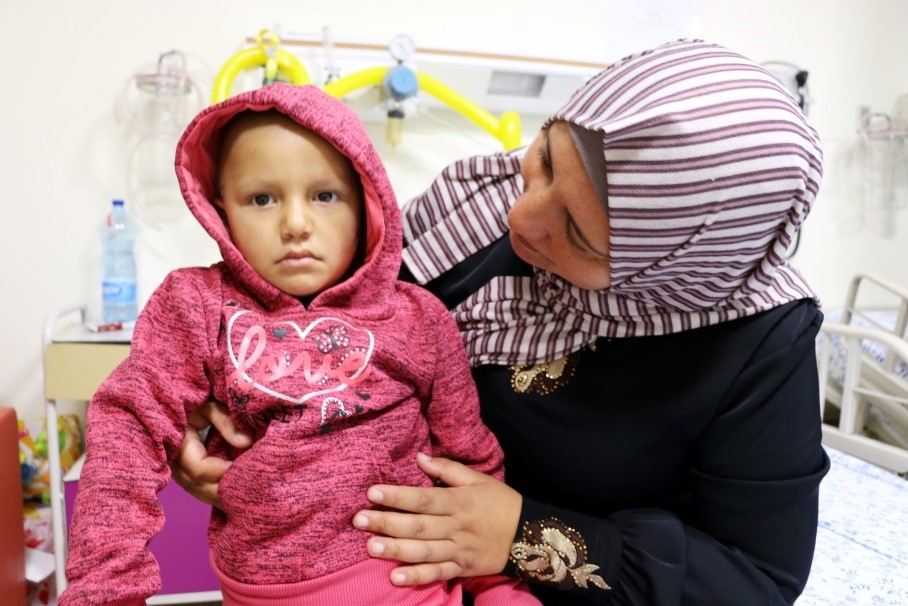 For children receiving permits to travel for healthcare, almost two-fifths (38% or 2,068 of the 5,459 approved permits for children) were approved for exit without the accompaniment of their parents.
For children receiving permits to travel for healthcare, almost two-fifths (38% or 2,068 of the 5,459 approved permits for children) were approved for exit without the accompaniment of their parents.
The benefit of family support to children is not only critical for emotional support of paediatric patients, but close involvement in a child’s healthcare improves family understanding of the child’s illness and needs for longer-term care. Non-approval of permits for patient companions represents a major barrier to ensuring effective care for children and others who are strongly dependent on families for longer-term care and recovery.
Related links:
WHO Monthly report on referral of pateints from the Gaza Strip, January, 2020
Health advice and resources: Coronavirus disease 2019 (COVID-19)
Below are links to official WHO health advice in Arabic and English on COVID-19 which can be printed, shared and distibuted.
| Advice for the public | Myth busters |
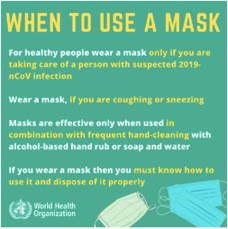 |
 |
| Arabic | Arabic |
| Videos | Questions and Answers |
 |
 |
| Advice for health workers | Guide to addressing social stigma |
|
|
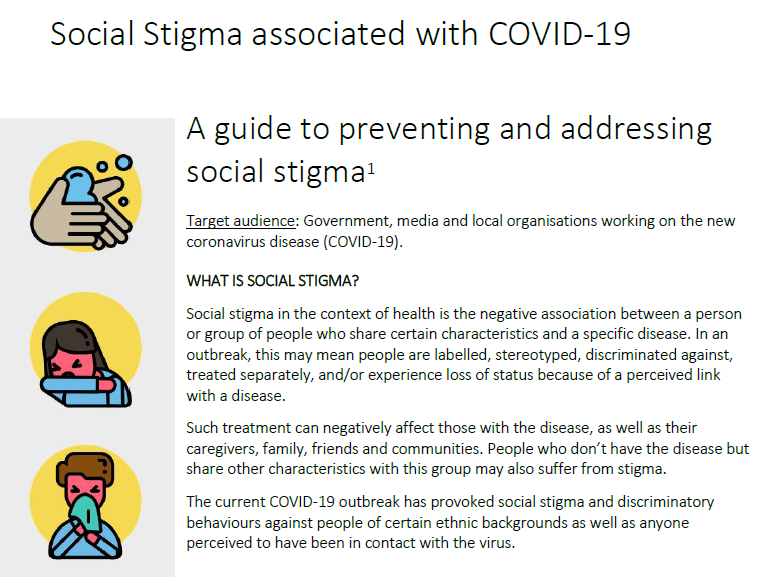 |
| Arabic | English |
Further information:
Dr. Gerald Rockenschaub, WHO oPt Head of Office,
Dr. Ayadil Saparbekov, WHO Health Emergencies Team Lead, WHO oPt,
Alice Plate, Communication Specialist, WHO oPt,
Another important step towards Universal Health Coverage (UHC) for all Palestinians

20 January 2020, Ramallah – Strong political leadership and engagement at a recent health reform workshop in the Occupied Palestinian Territory (oPt), has demonstrated further commitment towards achieving Universal Health Coverage (UHC), to enable all Palestinians to access quality health services without financial distress.
Despite Palestine’s long tradition of health insurance, people’s out of pocket expenses for healthcare remain high.
“No one should get sick and die just because they’re poor, or because the services they need are too far away,” said Dr Gerald Rockenschaub, WHO Head of Office. “Universal health coverage means ensuring people can get quality health services, where and when they need them – it means much more than just health insurance and health care.”
The workshop in Ramallah, hosted by the World Health Organization (WHO) and the Ministry of Health (MoH), was an initial consultation to discuss health financing reform (including health insurance) in further steps towards Universal Health Coverage for all. It follows a high-level mission in August 2019, which made 14 strategic recommendations to strengthen Palestine’s health system capacities with an emphasis on health service delivery and sustainable financing.
 At the workshop, the Palestinian Authority’s Minister of Health, Dr Mai Al Kaila (pictured), stressed the Government’s commitment to achieve Universal Health Coverage and emphasised the Ministry is already taking measures in this direction. WHO welcomed the Government’s continued commitment and strong partner engagement and Dr Rockenschaub stressed the importance of ongoing policy dialogue and political leadership to help achieve UHC.
At the workshop, the Palestinian Authority’s Minister of Health, Dr Mai Al Kaila (pictured), stressed the Government’s commitment to achieve Universal Health Coverage and emphasised the Ministry is already taking measures in this direction. WHO welcomed the Government’s continued commitment and strong partner engagement and Dr Rockenschaub stressed the importance of ongoing policy dialogue and political leadership to help achieve UHC.
Senior experts from WHO locally and globally facilitated the dialogue among a wide range of partners on health financing reform recommendations in presence of the Prime Minister’s Office, NGOs, donors, human rights organisations, Policy Forum, the Palestinian Institute of Public Health and representatives from the East Jerusalem Hospital Network.
Dr Awad Mataria, Director of Universal Health Coverage and Health Systems at WHO Regional Office for the Eastern Mediterranean, presented the current context of health financing stressing, highlighting the challenges and the need to strengthen the system, while Dr Agnès Soucat, Director Health Systems Governance and Financing, discussed recommendations and appropriate examples Palestine can follow to ensure reform and progress towards UHC.
Following this workshop, WHO will develop an action plan and a road map with an implementation outline of the identified priority actions described in the 14 recommendations. WHO will continue to support the Ministry of Health and all health partners in ongoing policy dialogue and technical support to achieve UHC as a means to promote the human right to health for all Palestinians.
Huda, a cancer nurse in Gaza: “We feel frustrated and helpless to watch as a patient’s health deteriorates.”
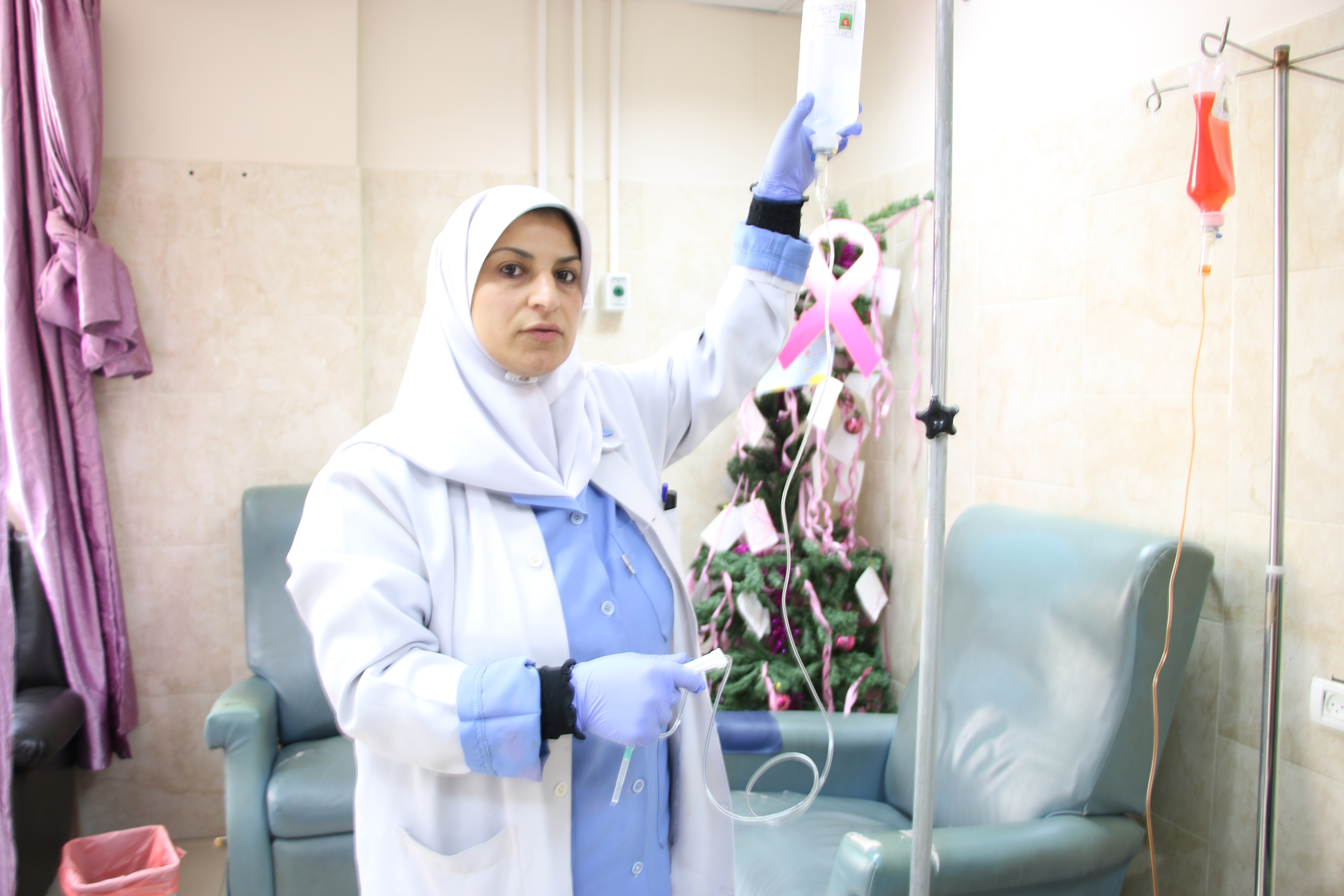 Huda is a nurse in the cancer outpatient department at Al Rantisi Hospital in Gaza City. She has been working with cancer patients for 15 years.
Huda is a nurse in the cancer outpatient department at Al Rantisi Hospital in Gaza City. She has been working with cancer patients for 15 years.
The work is not easy and cancer departments in Gaza face severe shortages of drugs and supplies, as well as lack of equipment. In November 2019, almost half (48%) of essential drugs stocks were at zero stock in Gaza’s Central Drugs Store. For chemotherapy drugs, the situation is even worse with 63% of essential drugs at zero stock.
Huda comments, “In addition to suffering the effects of cancer, patients suffer a lack of services, shortages of drugs and denial of their permits to reach services outside Gaza. We don’t have enough psychological support services or intensive care beds. When a woman has an appointment to get chemotherapy and the drug isn’t available, she’s disappointed and upset. It affects us as caregivers as well. Patients referred for care out of Gaza are also denied permits to exit. We feel frustrated and helpless to watch as a patient’s health deteriorates. Chemotherapy drugs require a specific schedule according to the treatment plan and delays mean worse outcomes for patients.»
Cancer patients require care outside the clinic, and Huda shares her personal number so that they have someone to turn to in moments of need or crisis. She contacts local societies to link patients into the mental health and psychosocial support services that are available.
Huda has her own personal experience of cancer, after her husband was diagnosed with testicular cancer over ten years ago. Her personal experience has given her insights into the need for strengthening psychological support for cancer patients and their families. “We were very shocked, but I tried to support my husband and to fight the battle with him. I’ve lived what it means to have a relative fighting cancer and I know the suffering patients go through during their journeys to get treatment. Especially when they have to reach health services outside Gaza.”
Huda is 38-years-old and has three children. She lives with her husband and children in Gaza City. She reflects on the crisis facing the health sector in Gaza, “We are living in a very hard situation. I always dream that cancer patients will have a specialized hospital here and that all the services they need will be available. Patients and health workers deserve a better environment. We deserve our rights.”
Related links:
WHO monthly reports on referral of patients from the Gaza Strip, November 2019









